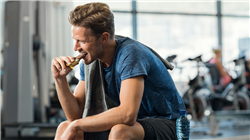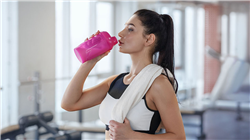University certificate
The world's largest faculty of nursing”
Introduction to the Program
With this Postgraduate diploma, based on Relearning, you will design comprehensive care plans, based on the understanding of the specific needs of patients according to their muscular physiology and metabolism”

Parathletes experience unique metabolic adaptations due to their disabilities and the physical exertion required by sports practice. These modifications can have a significant impact on nutrient metabolism, energy use and exercise response. Given this situation, the International Paralympic Committee stresses the importance of these athletes receiving comprehensive clinical care to ensure that they enjoy adequate nutrition that serves both to improve their quality of life and sporting performance. In this sense, nurses play an important role in this area by providing advice and planning personalized nutritional plans for these individuals.
Within this framework, TECH implements a revolutionary Postgraduate diploma in Muscular and Metabolic Physiology for Nursing. Its objective is to provide specialists with an understanding of the mechanisms underlying metabolic or muscular pathologies in order to develop individualized care strategies. The academic pathway will examine cardiovascular, hormonal and ventilatory adaptations related to exercise so that graduates can prevent exercise-related complications (such as exacerbation of respiratory diseases). Likewise, the teaching materials will delve into aspects such as the lactic threshold, protein metabolism or the mixed bioenergetics of muscle fibers. In line with this, the program will address the specific energy demands of para-sportsmen, addressing conditions such as spinal cord injuries, cerebral palsy or impaired vision. In addition, a prestigious International Guest Director will give intensive master classes to help graduates apply the principles of Muscular and Metabolic Physiology in the execution of nursing care.
Regarding the methodology of this university program, it is taught 100% online. In this sense, the only thing that nurses will need will be a device with Internet access to enter the Virtual Campus and enjoy the most complete materials. In addition, TECH uses its Relearning system, which guarantees progressive and natural learning for graduates.
A distinguished International Guest Director will offer several Masterclasses to delve into the workings of the human body in terms of movement, metabolism and response to exercise”
This Postgraduate diploma in Muscular and Metabolic Physiology for Nursing contains the most complete and up-to-date scientific program on the market. The most important features include:
- The development of practical cases presented by experts in Nutrition and Dietetics
- The graphic, schematic and eminently practical contents with which it is conceived gather scientific and practical information on those disciplines that are indispensable for professional practice
- Practical exercises where self-assessment can be used to improve learning
- Its special emphasis on innovative methodologies
- Theoretical lessons, questions to the expert, debate forums on controversial topics, and individual reflection assignments
- Content that is accessible from any fixed or portable device with an Internet connection
You will delve into Nutritional Planning for para-athletes and ensure they have the nutrients they need to optimize their athletic performance.their athletic performance”
The program’s teaching staff includes professionals from the industry who contribute their work experience to this program, as well as renowned specialists from leading societies and prestigious universities.
The multimedia content, developed with the latest educational technology, will provide the professional with situated and contextual learning, i.e., a simulated environment that will provide immersive education programmed to learn in real situations.
This program is designed around Problem-Based Learning, whereby the professional must try to solve the different professional practice situations that arise during the course. For this purpose, students will be assisted by an innovative interactive video system created by renowned and experienced experts.
You will implement into your daily practice the most cutting-edge therapeutic interventions to promote the muscular and metabolic health of your patients, as well as to address related pathological conditions"

You will accomplish your academic goals from the comfort of your home thanks to TECH's 100% online methodology"
Why study at TECH?
TECH is the world’s largest online university. With an impressive catalog of more than 14,000 university programs available in 11 languages, it is positioned as a leader in employability, with a 99% job placement rate. In addition, it relies on an enormous faculty of more than 6,000 professors of the highest international renown.

Study at the world's largest online university and guarantee your professional success. The future starts at TECH”
The world’s best online university according to FORBES
The prestigious Forbes magazine, specialized in business and finance, has highlighted TECH as “the world's best online university” This is what they have recently stated in an article in their digital edition in which they echo the success story of this institution, “thanks to the academic offer it provides, the selection of its teaching staff, and an innovative learning method aimed at educating the professionals of the future”
A revolutionary study method, a cutting-edge faculty and a practical focus: the key to TECH's success.
The most complete study plans on the university scene
TECH offers the most complete study plans on the university scene, with syllabuses that cover fundamental concepts and, at the same time, the main scientific advances in their specific scientific areas. In addition, these programs are continuously being updated to guarantee students the academic vanguard and the most in-demand professional skills. In this way, the university's qualifications provide its graduates with a significant advantage to propel their careers to success.
TECH offers the most comprehensive and intensive study plans on the current university scene.
A world-class teaching staff
TECH's teaching staff is made up of more than 6,000 professors with the highest international recognition. Professors, researchers and top executives of multinational companies, including Isaiah Covington, performance coach of the Boston Celtics; Magda Romanska, principal investigator at Harvard MetaLAB; Ignacio Wistumba, chairman of the department of translational molecular pathology at MD Anderson Cancer Center; and D.W. Pine, creative director of TIME magazine, among others.
Internationally renowned experts, specialized in different branches of Health, Technology, Communication and Business, form part of the TECH faculty.
A unique learning method
TECH is the first university to use Relearning in all its programs. It is the best online learning methodology, accredited with international teaching quality certifications, provided by prestigious educational agencies. In addition, this disruptive educational model is complemented with the “Case Method”, thereby setting up a unique online teaching strategy. Innovative teaching resources are also implemented, including detailed videos, infographics and interactive summaries.
TECH combines Relearning and the Case Method in all its university programs to guarantee excellent theoretical and practical learning, studying whenever and wherever you want.
The world's largest online university
TECH is the world’s largest online university. We are the largest educational institution, with the best and widest online educational catalog, one hundred percent online and covering the vast majority of areas of knowledge. We offer a large selection of our own degrees and accredited online undergraduate and postgraduate degrees. In total, more than 14,000 university degrees, in eleven different languages, make us the largest educational largest in the world.
TECH has the world's most extensive catalog of academic and official programs, available in more than 11 languages.
Google Premier Partner
The American technology giant has awarded TECH the Google Google Premier Partner badge. This award, which is only available to 3% of the world's companies, highlights the efficient, flexible and tailored experience that this university provides to students. The recognition as a Google Premier Partner not only accredits the maximum rigor, performance and investment in TECH's digital infrastructures, but also places this university as one of the world's leading technology companies.
Google has positioned TECH in the top 3% of the world's most important technology companies by awarding it its Google Premier Partner badge.
The official online university of the NBA
TECH is the official online university of the NBA. Thanks to our agreement with the biggest league in basketball, we offer our students exclusive university programs, as well as a wide variety of educational resources focused on the business of the league and other areas of the sports industry. Each program is made up of a uniquely designed syllabus and features exceptional guest hosts: professionals with a distinguished sports background who will offer their expertise on the most relevant topics.
TECH has been selected by the NBA, the world's top basketball league, as its official online university.
The top-rated university by its students
Students have positioned TECH as the world's top-rated university on the main review websites, with a highest rating of 4.9 out of 5, obtained from more than 1,000 reviews. These results consolidate TECH as the benchmark university institution at an international level, reflecting the excellence and positive impact of its educational model.” reflecting the excellence and positive impact of its educational model.”
TECH is the world’s top-rated university by its students.
Leaders in employability
TECH has managed to become the leading university in employability. 99% of its students obtain jobs in the academic field they have studied, within one year of completing any of the university's programs. A similar number achieve immediate career enhancement. All this thanks to a study methodology that bases its effectiveness on the acquisition of practical skills, which are absolutely necessary for professional development.
99% of TECH graduates find a job within a year of completing their studies.
Postgraduate Diploma in Muscular and Metabolic Physiology for Nursing
If you are a nursing professional committed to excellence in the care of your patients, the Postgraduate Diploma in Muscular and Metabolic Physiology at TECH Global University is the ideal program for you. Through our 6-month virtual classes, you will become an expert in muscle and metabolic physiology, acquiring the knowledge and skills necessary to provide quality care based on scientific evidence. We pride ourselves on offering cutting-edge academic programs that are tailored to the needs of healthcare professionals. Our Postgraduate Diploma in Muscle and Metabolic Physiology is delivered virtually, allowing you to access classes from anywhere and at a time that best suits your needs. During the program, you will explore in depth the fundamental aspects of muscle and metabolic physiology. You will learn about the metabolic processes that occur in the human body, how they relate to this muscle function and how they can influence the health and well-being of patients.
Master muscle and metabolic physiology and provide quality nursing care
You will be taught by a highly qualified faculty of experts in muscle and metabolic physiology, as well as nursing professionals. Through interactive classes, clinical case studies and practical activities, you will develop a deep understanding of physiological processes and their application in the nursing field. Upon completion of the program, you will be able to apply the acquired knowledge to provide nursing care based on muscle and metabolic physiology. You will be able to assess and monitor the metabolic status of patients, design personalized care plans and contribute to improving their quality of life. Your expertise in muscle and metabolic physiology will make you a highly valued professional in the nursing field. Enroll today and take your nursing practice to the next level - master physiology and provide quality patient care!







